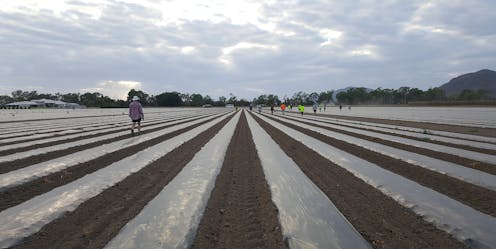Australia needs better working conditions, not shaming, for Pacific Islander farm workers
- Written by Victoria Stead, Senior Research Fellow, Alfred Deakin Institute for Citizenship and Globalisation, Deakin University

I met Elisabeth the day she learned she was being sent back to Vanuatu.
She had arrived in Shepparton, in north-central Victoria, two months earlier. She was meant to stay for six months, working in a packing shed as part of the Seasonal Worker Programme, which provides temporary visas to workers from nine Pacific Island countries and Timor-Leste (East Timor).
But her employer had decided she wasn’t productive enough. So Elisabeth’s contract had been cancelled. She had hoped to save a few thousand dollars from her time in Australia, enough to buy a small plot of land on which to build a house and transform her family’s life. Instead she was taking back a plastic shopping bag with chocolate Easter eggs she had bought that afternoon at the supermarket in a nearby town.
Read more: If Australia cares about Pacific nations, we should also invest in their care givers[1]
More that 80% of workers in Australia’s horticultural industry industry are migrants on temporary work visas (or undocumented). The Seasonal Worker Programme is often regarded as one of the better pathways to this work.
It is, for example, more highly regulated than the larger (pre-pandemic) Working Holiday Maker scheme, which provides the industry with backpackers. In 2020-21 it provided about 12,000 of the roughly 80,000 strong (formally employed) seasonal workforce.
But the regulations are a double-edged sword, also working as mechanisms of control[2].

















